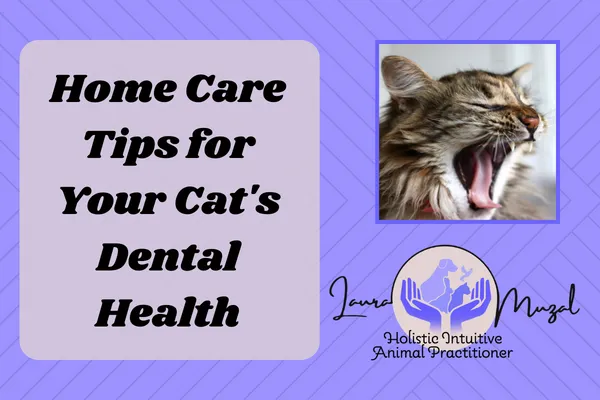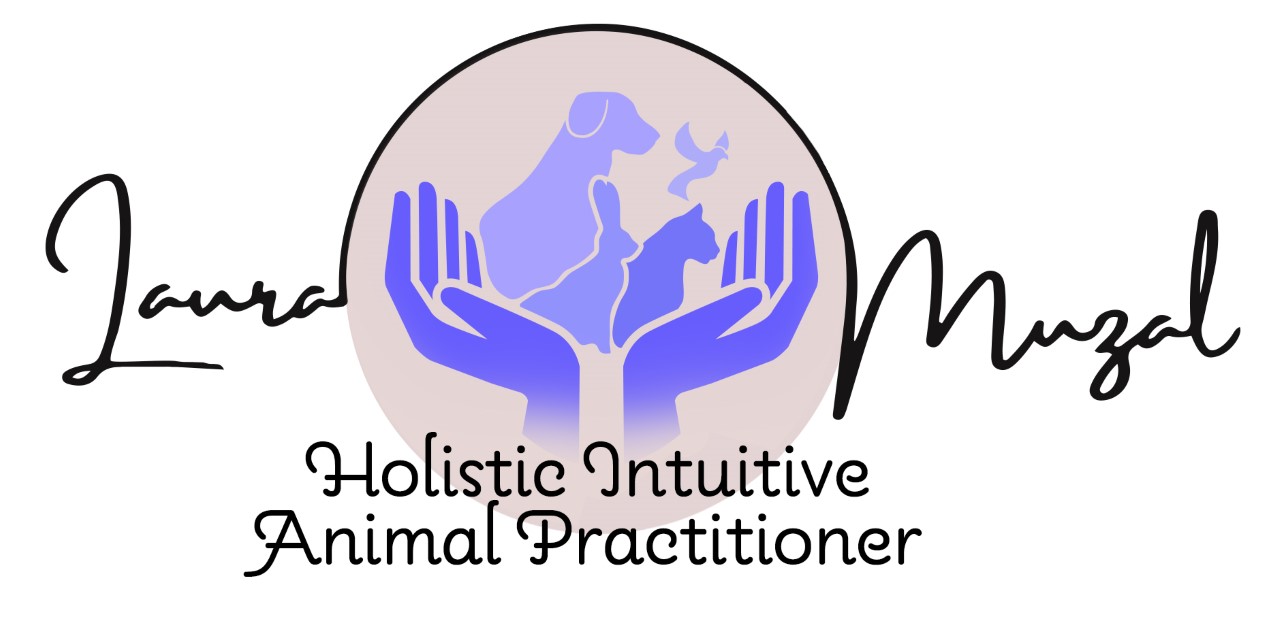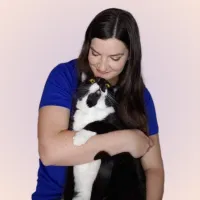Pawsitively Holistic: Your Guide to Pet Wellness

Home Care Tips for Your Cat's Dental Health

Home Care Tips for You Cat's Dental Health
Taking care of your cat's dental health from a young age is more than just a routine – it's a key factor in keeping your feline friend happy and healthy. Beyond preventing issues like gingivitis, establishing good dental care habits at home ensures their well-being and keeps their breath fresh.
Cats And Dental Health
Dental issues impact a significant percentage of cats aged four and above. Wild or outdoor cats naturally maintain dental health by consuming rodents (providing a flossing motion through fur and abrasive action from bones). Domestic cats usually lack such opportunities. Being carnivores, their digestive tract is designed for high protein and minimal carbs. Unlike human teeth, which are flatter for grinding, cat teeth are specialized for ripping and tearing. Cat's also lack the enzymes that humans have in our mouths to combat germs. Without the regular trapping and consumption of mice or other small rodents, your indoor cat may not receive adequate dental stimulation, increasing the risk of developing dental diseases and highlighting the importance of at home dental care.
Is Dental Care Necessary For Cats?
Cats may not express pain or illness in ways we easily comprehend. This emphasizes the importance of adopting preventive health routines for your pets, especially concerning dental care. Regularly monitoring your cat's teeth and gums is crucial to ensure they remain in good condition.
Cats aged three and above commonly experience tooth and gum issues due to the accumulation of germs, debris, and plaque from their food. The bacterial coating hardens into tartar, leading to gum irritation, gingivitis, and potential tooth loss. Severe tartar buildup may even require tooth extraction.
Pet parents are often surprised to discover that their pet's dental health significantly influences their overall well-being. Given that blood circulates throughout a pet's body, any issues in their mouth could ultimately impact internal organs.
Pain and inflammation in a cat’s mouth can hinder eating or drinking, and the introduction of germs into their system may result in kidney and other organ damage.
What Dental Care Do Cats Need?
Effective cat teeth cleaning requires more than surface-level care. Thorough oral examinations and x-rays conducted under anesthesia become crucial to detect potential dental problems concealed behind the gum line. Feline resorptive lesions, which mimic cavity formations on or near the tooth's surface, may manifest both above and below the gumline, often stemming from cell damage in the tooth structure and potentially causing discomfort.
In promoting dental health for your feline companion, consider focusing on three fundamental methods:
Proper Diet and Nutrition: The foundation of good dental health starts with providing your cat with a nutritious diet. Ensuring they receive the right balance of nutrients contributes to overall well-being, including dental health.
Regular Professional Dental Examinations: Routine check-ups conducted by a professional veterinarian are vital for maintaining your cat's dental health. These examinations go beyond what the eye can see, allowing for early detection and intervention in case of any dental issues.
Establishing a Dental Care Routine at Home: In addition to professional care, incorporating a dental care routine at home is equally important. This involves regular tooth brushing, the use of feline-friendly dental products, and creating a comfortable environment for your cat to acclimate to these practices.
By addressing your cat's dental care through these three key methods, you can contribute significantly to their overall health and happiness, ensuring a bright and comfortable future for your feline friend.
How Do I Take Care Of My Cat's Teeth?
Taking care of your cat's teeth involves various approaches, and ensuring proper dental care demands dedication and effort. Equipping yourself with the right tools is essential to make this task more manageable. While dental kits are available at veterinary clinics and pet retailers, make sure to avoid using human toothpaste on cats due to its high fluoride content, which can be harmful if ingested. Opt for fluoride-free cat toothpaste, often flavored with beef or chicken.
Begin caring for your cat's dental health with these steps:
Establish Good Oral Health: Initiate dental care by providing your cat with a quality diet, laying the foundation for good oral health.
Start Early: Introduce dental routines when your cat is young, helping them acclimate to the process more smoothly.
Semi-Annual Checkups: Prioritize regular checkups with the vet, occurring twice a year to monitor and maintain your cat's dental health.
Watch for Signs: Keep an eye out for potential dental issues, such as bad breath or obvious pain, and address them promptly.
Communication is Key: During veterinary visits, communicate any observed unusual behavior or signs of pain, like avoiding eating or wincing.
Early Prevention: Actively engage in early prevention strategies to avoid the development of significant dental disorders.
Brushing Techniques: When brushing your cat's teeth, utilize a toothbrush designed for cats. Cradle your cat from behind to provide a sense of safety, gently tilt their head back, raise their chin, and open their lips to access their teeth. Avoid using dental floss, as it poses a serious threat to cats due to the risk of ingestion and potential intestinal harm.
By incorporating these steps into your cat's dental care routine, you're greatly contributing to their overall well-being and helping to ensure a healthy and happy feline friend!
How Often Should I Clean My Cat's Teeth?
To support your cat's dental well-being at home, consider brushing their teeth twice a day to prevent dental issues. Making this a habit early in a kitten's life is very helpful for both you and your cat as adult cats have a tougher time adjusting to a new dental care routine (trust me).
If your cat is resistant to teeth brushing, these options are helpful alternatives:
Dental Rinses: Dental rinses can help delay the growth of dental disease by minimizing plaque and tartar development.
Dental Chews: Dental chews can help scrape plaque off of teeth as the cat chews. Just make sure your cat is actually chewing the treat because swallowing it whole won't provide the same oral health benefits. Foods like carrots or cucumbers can be great for this, or you can purchase treats specially formulated for dental health.
Final Thoughts
Unfortunately, dental issues are pretty common in our feline friends, with things like gingivitis and periodontal disease showing up around the age of four. Cats can be tricky to read for dental pain since they adapt to discomfort slowly. That's why regular vet checkups are so important – it's a chance to chat with your vet about oral health, preventive care, and the routines your cat might need.
Dental problems don't just affect the teeth; they can mess with a cat's overall health, leading to things like malignancies, heart and lung issues, tummy troubles, and kidney disease. Keeping up with dental care not only makes your cat happier but also boosts their resilience to illness.
Considering that about 70% of cats deal with some form of dental issue by the age of two, it's vital to weave practices like brushing, chewing, treats, and rinses into their routine. If gingivitis crops up, a dental cleaning under anesthesia might be in the cards for your pet. You can read more about dental cleaning under anesthesia here. Chatting with your vet is the key to figuring out what's best for your furry friend, ensuring they stay healthy and happy through proper oral care.
Related Reading:
Dental Health for Pets: It’s Not as Scary as You Think
Dental Cleaning and Anesthesia for Pets - Is it Safe?
Home Care Tips for Your Dog's Dental Health
CBD for Periodontal Disease in Dogs and Cats
Have More Questions or Need Personalized Pet Care Advice?
If you have additional questions or need personalized guidance for your beloved pet, I'm here to help. Book a call with me, and let's discuss how to best care for your furry friend. Your pet's well-being is my priority, and I'm dedicated to providing the support and expertise you need. Click here to schedule your consultation today. Together, we can ensure your pet leads a happy, healthy life.
Affiliate Disclosure: Some of the links on this blog are affiliate links. If you make a purchase through these links, the blog owner may earn a commission at no extra cost to you.

